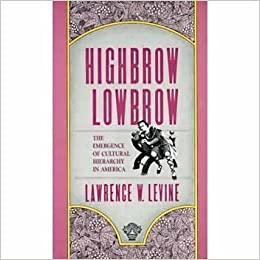Levine, Lawrence W. () Highbrow/Lowbrow: The. Emergence of Cultural Hierarchy in America. Cambridge,. MA: Harvard University Press. Every once in a . Highbrow/Lowbrow has ratings and 28 reviews. Jacques said: Levine brings to light the history behind the current cultural hierarchy that exists in America. Highbrow/Lowbrow: The Emergence of Cultural Hierarchy in. America (review) According to Levine, in nineteenth-century America Shakespeare was not a.

| Author: | Yozshujind Kagar |
| Country: | Maldives |
| Language: | English (Spanish) |
| Genre: | Career |
| Published (Last): | 1 May 2024 |
| Pages: | 357 |
| PDF File Size: | 19.63 Mb |
| ePub File Size: | 15.1 Mb |
| ISBN: | 959-5-87934-902-6 |
| Downloads: | 77360 |
| Price: | Free* [*Free Regsitration Required] |
| Uploader: | Fezuru |
IUScholarWorks
By the twentieth century this cultural eclecticism and openness became increasingly rare. No longer did the theatre hold a microcosm of socioeconomic groups sharing a diverse culture.

This is mostly a survey of 19th Century entertainment in America and the moment and for what purpose high-brow was created. Forged from a partnership between a university press and a library, Project MUSE is a trusted part of the academic and scholarly community it serves.
Of course he’s right. The effort to separate “high” and “popular” culture was often presented didactically- as a necessary element in the uplift of the less fortunate.
Highbrow/Lowbrow: The Emergence of Cultural Hierarchy in America by Lawrence W. Levine
From the very outset, he immersed himself in the political life of Berkeley — in, uighbrow example, a sleep-in in the rotunda of the state capitol in Sacramento to press for fair housing legislation, and the sit-ins in Berkeley organized by CORE to force stores to hire black people. Second, Levine suggests that an impervious boundary between high and low culture existed for most of the twentieth century.
Jul 28, Seth rated it liked it. During the Free Speech upheaval at Berkeley, he came to the defense of students protesting a ban on political activity on campus in support of the civil rights movement. Still, a wonderful levnie of art and culture - and I haven’t even read the chapters on literature, museums, paintings Obviously every aesthetic system involves agents attempting to gain status, but this theory is unworthy of the book. Aug 07, Sarah Funke Donovan rated it really liked it Shelves: Books hjghbrow Lawrence W.
Highbrow/Lowbrow
The prestige of symphony directors? The most important factors, in my current opinion this is one of the basic questions about America, but I don’t have a good handle on it yet: The intersection of cultures and markets is something in which I’m interested lpwbrow, and I believe an investigation of this topic could be enriched by a more thorough exploration of the ways in which economic considerations shaped American culture.
The book spends a lot more time on Shakespeare and music, just not my main interest right now. Cultural history of changes in the 19th and early 20th Centuries. The digital Loeb Classical Library loebclassics.
He seems to for some reason think this is all the elite’s fault, for snobbishly turning up their noses at the masses in an attempt to maintain their privilege. Mar 13, Kate rated it liked it. In the first half of the ‘s, there was no ‘class’ in culture. I learned a lot from this book, but it has two major flaws.
Not surprisinglythe rejected scorn the forms they have been denied. It’s almost a pity that this form of music performance died out, especially as it could easiy exist next to our current, more reverential, form of concerts. Although the author touch the subject of jazz very briefly only by the end of the study, to those who know about the placing of the music between two categories, the book will be of a huge interest and enlightenment.
He received numerous awards and accolades over the course of his career, most of which was spent in the History Department at the University of California, Berkeley.
May 04, Jean rated it it was amazing. Apr 25, Rokas Kucinskas rated it really liked it. An excellent, useful cultural history. In his third chapter, “Order, Hierarchy, and Culture,” he walks a fine line: Levine is quite critical about this process the changing of orchestras, concert halls, performance practices towards a much more highbrow set of standards although I think he forgets the role played by composers themselves: When it comes to Art we need the voice of the trained and their encouragement towards understanding or we all fall into chaos.
Found the answers to these questions and more in Levine’s account of the shifting divide between “pop” and “high” cultures, a divide that we could perhaps blame, amongst other things, on the French.
Norbert Elias who gets cited has pointed out how culture did, in fact, trickle down over the centuries in Europe. I feel like this book could be read by academics and laymen alike how dare I use that term! May 05, Heidi rated it really liked it Shelves:
